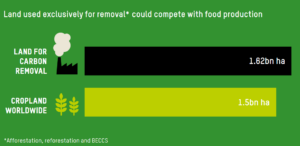False Solutions: To Achieve Net Zero, Carbon Offsetting Would Use Up All Global Farmland

All Global Research articles can be read in 51 languages by activating the “Translate Website” drop down menu on the top banner of our home page (Desktop version).
Visit and follow us on Instagram at @crg_globalresearch.
***
In the coming months, in the run up to the crucial COP26 climate talks in Scotland, there will be a slew of false solutions on climate change announced, whether carbon, capture and storage (CCS) or carbon offsetting.
For years, climate campaigners have argued that offsetting carbon emissions does not work for the simple reason that it allows companies to carry on polluting.
But more and more companies are using offsets as a way of greenwashing their operations, arguing that they are on a path to net zero.
And of course, the oil industry spindoctors at the American Petroleum Institute also advocated offsetting in their fundamentally flawed Climate Action Plan, which they published earlier this year.
And now there is even more evidence that they are a completely false solution to our climate emergency. The development charity Oxfam has a new report out today which has analysed just how much land is needed for carbon offsetting techniques, including planting trees and Bioenergy with carbon capture and storage (BECCs).
Put simply, there is not enough land on the planet. Oxfam calculates “that the total amount of land required for planned carbon removal could potentially be five times the size of India, or the equivalent of all the farmland on the planet.”
Or put another way:
“Land used exclusively for carbon removal that could compete with food production could range up to 1.62bn ha, which is more than the total existing cropland,” says Oxfam.
The development charity analysed the net zero targets of just four of the big oil and gas producers: Shell, BP, Total and ENI.
According to Oxfam:
“Their plans alone could require an area of land twice the size of the UK. If the oil and gas sector as a whole adopted similar net zero targets, it could end up requiring land that is nearly half the size of the United States, or one-third of the world’s farmland.”
This could increase food prices by about 80% by 2050, pushing “millions more people in vulnerable communities into hunger.”
It is a nonsensical solution to climate change. As Oxfam says in its report:
“What is needed is an immediate, dramatic and irreversible reduction in the billions of tonnes of carbon these countries and corporations are pumping into the atmosphere on a daily basis.”
Danny Sriskandarajah, the chief executive of Oxfam GB, told the Guardian:
“Too many companies and governments are hiding behind the smokescreen of ‘net zero’ to continue dirty business-as-usual activities.”
Sriskandarajah continued:
“A prime example of the doublethink we are seeing is the oil and gas sector trying to justify its ongoing extraction of fossil fuels by promising unrealistic carbon removal schemes that require ludicrous amounts of land.”
And there is another problem with offsetting. As the wildfires in the Pacific North West of the US continue to burn, they are now destroying forests that have been planted to offset carbon emissions, effectively making the offsets worse than useless. Offsets are meant to store the carbon, not emit them into the atmosphere.
The Financial Times reports today that “Forests in the US that generate the carbon offsets bought by companies including BP and Microsoft are on fire as summer blazes rage in North America.”
“In Washington and Oregon, at least two forestry projects used by companies including BP and Microsoft are ablaze.” Last month, fires burnt through the Colville Indian Reservation in Washington, damaging a project that BP has bought 13m offsets from in transaction valued at more than $100m.
Meanwhile, in Oregon, the infamous Bootleg fire destroyed forests that provided Microsoft with offsets too.
Others are concerned too:
Some people make it seem as if we’re not doing enough to stop the climate crisis. But that’s not true.
Because to not do enough, you have to do something. And the truth is that we are basically not doing anything apart from “creative carbon accounting” and creating loopholes.1/2
— Greta Thunberg (@GretaThunberg) August 3, 2021
So we enter a vicious circle: fossil fuels are causing climate change, leading to excessive heat which is causing wildfires which are destroying the trees planted to offset carbon emissions. It makes no sense. And that is before we start to take away farmland from an already hungry world.
*
Note to readers: Please click the share buttons above or below. Follow us on Instagram, @crg_globalresearch. Forward this article to your email lists. Crosspost on your blog site, internet forums. etc.
Featured image is from Oil Change International

